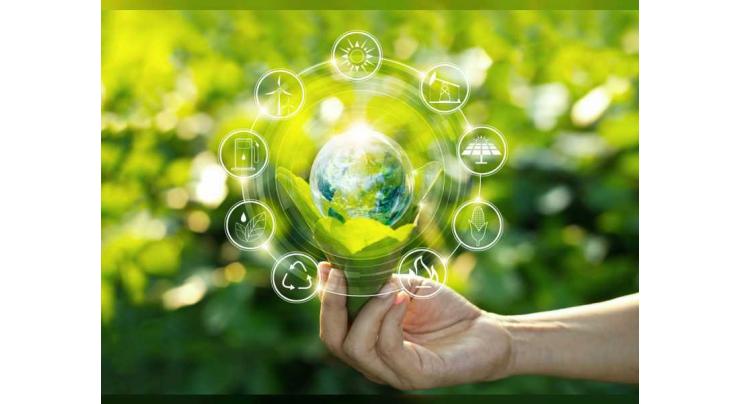
Sustainability Experts Discuss Objectives Of UAE Circular Economy Policy
Sumaira FH Published June 21, 2021 | 10:00 PM

DUBAI, (UrduPoint / Pakistan Point News / WAM - 21st Jun, 2021) The Dubai Chamber Sustainability Network Task Force on Waste Management recently organised a webinar that put the spotlight on the UAE’s Circular Economy Policy, highlighting its objectives and the best practices that businesses can adopt for the development of the country’s green economy.
The webinar, titled "Exploring UAE Circular Economy Policy and Role of the Private Sector" in achieving its goals, examined the role of companies in fostering partnerships and collaborations and raising awareness of closed-loop concepts among consumers.
Aisha Saeed Salim Al Souqi, Environmental Researcher, Ministry of Climate Change and Environment, UAE, stated that the efficient use of natural resources to reduce environmental stress, shift to cleaner industrial production strategies, processes, tools and techniques through the use of artificial intelligence and other technologies are the main objectives of the policy.
She highlighted the importance of close cooperation between public-private sector stakeholders to identify opportunities, establish an action plan with targets designed to ensure a smooth transition to the circular economy and set up systems necessary to collect, monitor, analyse, report and use circular economy metrics.
Jamila El Mir, Policy and Strategy Advisor, Sustainable Development, The General Secretariat of the Executive Council of Dubai, spoke about how it is equally important to engage and educate consumers, create accountability and ownership among them towards sustainable and responsible consumption.
She emphasised that consumers have a role to play in promoting responsible and sustainable practices.
Madhu Mohan S, Chief Innovation Officer, Environment Solutions, Dulsco LLC, said the private sector needs to have a proper business plan for the entire lifecycle of a product. He emphasised that the circular economic model is not a burden or a cost, but rather a value creation in a competitive economy. He noted that the government should also focus on creating a level playing field through incentives and schemes for sustainable products for their premium value.
Wael Ismail, Sr. Director Public Policy and Corporate Affairs, PepsiCo, spoke about how constructive government policies, responsible production processes and sustainable products are more crucial than ever before. Businesses that fail to implement such practices may face long-term consequences, he explained and called on multinational companies and local businesses to work together to maximise their efforts and adopt circular economy business models.
Addressing participants, Dr. Kamel Mellahi, Senior Manager, Dubai Chamber Centre for Responsible Business, explained that the transition to the circular economy is a major focus of the Dubai Chamber Sustainability Network. He noted that furthering collaboration between the government, business and all segments of society is key to shifting from a linear mode of production and consumption to a circular economic model that can create long-term economic, social and environmental benefits.
Related Topics
Recent Stories

Robinson, bowlers help New Zealand go 2-1 up against Pakistan

Shahzeb Chachar to hold khuli kachehri on April 26

Heatwave amid Israel's aggression in Gaza brings new misery, disease risk

Tourism must change, mayor says as Venice launches entry fee

Court adjourns Judicial Complex attack case till May 17

Nasreen Noori’s book ‘Popatan Jahra Khwab’ launched

Wafaqi Mohtasib inspection team visits Excise and taxation office

AJLAC announces 5th Conference titled ‘People’s Mandate: Safeguarding Civil ..

Pak-US officials engage to enhance trade, investment ties

IBCC to promote educational excellence, expand regional presence

Pakistani 'Blue Helmets' serving UN Peacekeeping Mission in DR Congo set to leav ..

Putin says plans to visit China in May
More Stories From Middle East
-

UAE announces ‘Zero Bureaucracy Program’ to reduce bureaucracy
3 months ago -

COP28 President-Designate welcomes Transitional Committee agreement to operationalise Loss and Damag ..
6 months ago -

Global Media Congress 2023 to feature Co-Production Majlis as a new networking platform
6 months ago -

Young female athletes shine at Abu Dhabi World Youth Jiu-Jitsu Championship
6 months ago -

King of Jordan receives Abdullah bin Zayed and ministers participating in Arab coordination meeting
6 months ago -

Abdullah bin Zayed participates in coordination meeting of Arab foreign ministers, joint meeting wit ..
6 months ago
-

3rd annual conference of Emirates Society of Clinical Microbiology kicks off in Dubai
6 months ago -

SIBF 2023 hosts Nobel laureate to discuss emergence of ‘Afrofuturism’ in global discourse
6 months ago -

ALC announces winners of Kanz Al Jeel Award 2023
6 months ago -

SIBF turns spotlight on remarkable contributions of women
6 months ago -

Global assets in spot bitcoin ETFs hit $4.16 billion
6 months ago -

Rescuers struggle to find Nepal quake survivors as deaths reach 157
6 months ago











